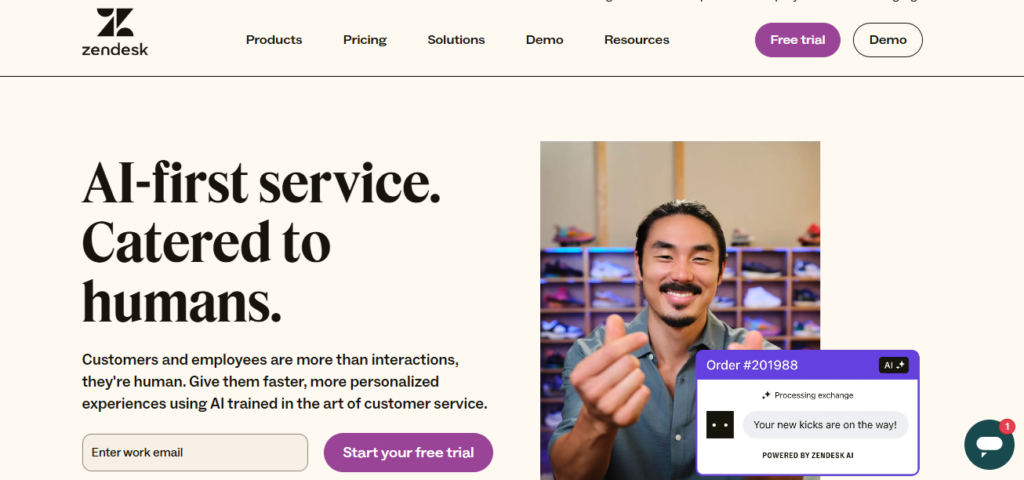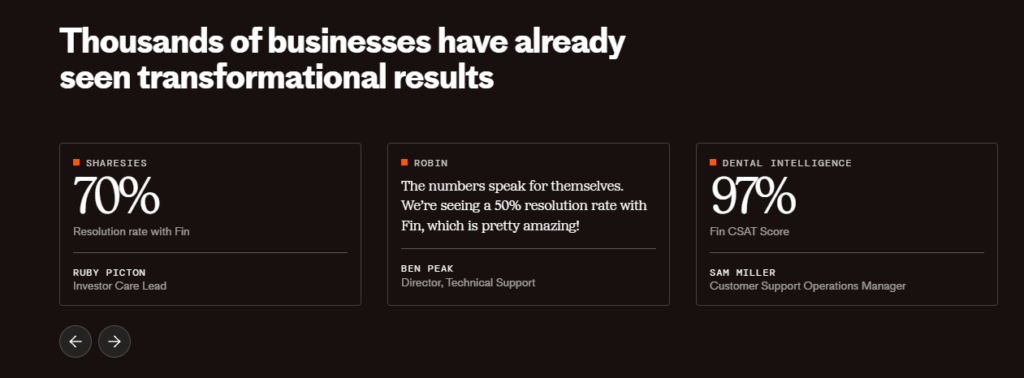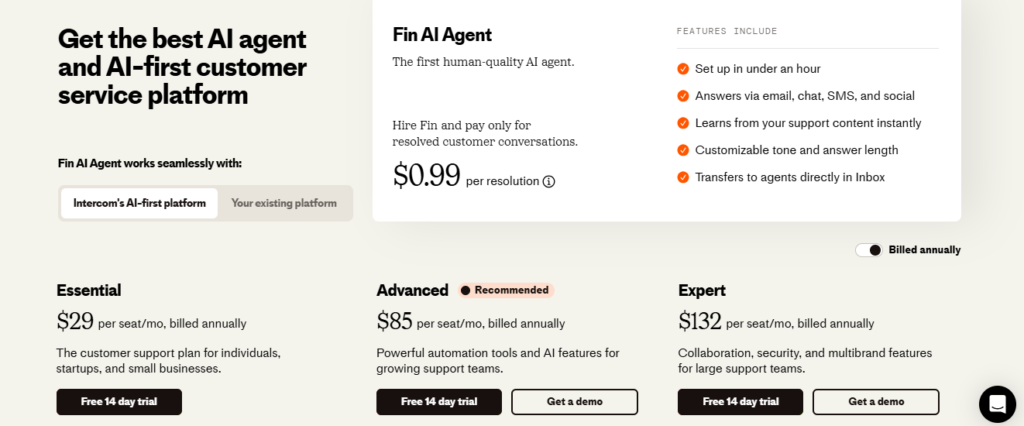
Table of Contents
1. Introduction
For small businesses, great customer support can make all the difference. People expect fast responses, smooth interactions, and personalized service—and that’s where AI-powered support platforms come in. The right tool can automate replies, handle customer requests efficiently, and even reduce costs, helping businesses provide top-notch service without overloading their teams.
Two of the biggest names in AI-driven customer support are Intercom and Zendesk. Both platforms offer chatbots, automation, and self-service options, but they take different approaches. Intercom focuses on conversational AI and real-time engagement, while Zendesk is built around a structured ticketing system and organized customer support.
So, which one is the best fit for your business? In this post, we’ll compare Intercom vs. Zendesk with AI, breaking down their features, ease of use, pricing, and overall performance to help you decide which platform meets your needs.
2. Overview: Intercom vs Zendesk AI
When it comes to AI-powered customer support, Intercom and Zendesk take different approaches to helping businesses manage customer interactions.
2.1 Intercom AI-Powered Conversational Support

Intercom is ideal for businesses seeking real-time, AI-powered customer engagement. Its smart chatbots handle inquiries, qualify leads, and improve over time, making support faster and more efficient. A standout feature is proactive messaging, which boosts customer interaction by reaching out before they ask for help.
Beyond chatbots, Intercom offers a self-service portal, reducing support tickets and improving workload management. Its AI-powered workflows route inquiries efficiently, while integrations with CRM, email marketing, and sales automation tools make it a comprehensive support solution.
However, Intercom’s higher pricing may not suit small businesses. It shines in conversational AI, but lacks the structured ticketing system some companies need. It’s best for businesses wanting personalized, AI-driven interactions at scale.
2.2 Zendesk: AI-Driven Ticketing and Omnichannel Support

Zendesk is great for businesses that need an organized customer support system. While Intercom focuses on AI chat, Zendesk is all about ticketing and automation. Its AI helps sort inquiries, suggest responses, and provide helpful articles, making support faster and more efficient.
Its omnichannel support allows businesses to manage email, social media, calls, and live chat from one platform, ensuring seamless communication. AI-powered analytics and reporting provide valuable insights for optimizing customer service.
However, Zendesk’s chatbots are more ticket-focused, lacking the conversational AI engagement of Intercom. Still, for businesses handling high volumes of inquiries, it remains a cost-effective and efficient support solution.
2.3 Key Differences
The key difference between the two platforms lies in their focus. Intercom is best for conversational AI and real-time engagement, making it ideal for businesses that want to chat with customers actively. Zendesk, however, is better suited for structured customer service, where efficient ticket handling and workflow automation are a priority.
3. AI Features Comparison
| Feature | Intercom AI Capabilities 🤖 | Zendesk AI Capabilities 🎟️ |
|---|---|---|
| AI Chatbots | Smart chatbots for lead qualification and instant support 🤝 | AI assists agents by suggesting pre-written responses ✍️ |
| Automation | AI-powered workflows for routing inquiries and reducing wait times ⚡ | AI-driven ticket sorting to prioritize urgent issues 📌 |
| Self-Service | Automated help centers and knowledge bases 📚 | AI suggests relevant articles for self-service ✅ |
| Personalized Messaging | Machine learning for tailored customer interactions 💬 | AI detects customer sentiment and urgency to prioritize requests 🚀 |
4. Ease of Use and User Experience
Choosing a customer support platform isn’t just about features—it’s also about how easy it is to use. A platform that’s too complex can slow down your team, while one that’s too simple might lack the tools you need. Intercom and Zendesk offer different user experiences, catering to different business needs. Let’s break down how their interfaces, learning curves, and customization options compare.
4.1 Intercom’s Modern, Chat-First UI vs. Zendesk’s Structured, Ticket-Based Interface

Intercom is built around real-time conversations, making it feel like a modern messaging app. Its clean, chat-first interface is intuitive, allowing businesses to easily manage live chats, automate responses, and engage with customers.

In contrast, Zendesk follows a more traditional, ticket-based approach, which is ideal for businesses that handle high volumes of structured support requests. While both platforms integrate AI, their user experiences cater to different support styles—Intercom for conversational engagement and Zendesk for efficient, organized support management.
4.2 Learning Curve for Small Business Owners
For small business owners, Intercom is generally easier to learn. Its AI-powered chatbots and automation tools require minimal setup, making it a great choice for those who prefer a messaging-first approach without a steep learning curve. Zendesk, on the other hand, comes with more advanced customization and a complex ticketing system, which can take longer to master. While Zendesk provides powerful support management tools, it might feel overwhelming to beginners compared to Intercom’s straightforward, real-time chat experience.
4.3 Dashboard Customization and Navigation Differences
Both platforms offer customization options, but in different ways. Intercom makes it easy to set up workflows, automate conversations, and customize the support experience without much hassle. It’s built for smooth navigation, especially for teams focusing on real-time interactions. Zendesk, however, allows for deeper customization in ticket handling—businesses can create custom fields, automation rules, and workflow triggers to optimize support operations. While this flexibility is great for structured customer service, it also adds complexity, making Zendesk’s dashboard less beginner-friendly compared to Intercom’s streamlined interface.
Check out Deel vs remote.com if you are looking for the best global payment and hiring solution platforms
5. Integration and Compatibility
Both Intercom and Zendesk offer strong integrations but serve different needs. Intercom focuses on engagement, seamlessly connecting with CRM tools, Slack, and email marketing platforms to help teams sync conversations across support, sales, and marketing. Zendesk, on the other hand, excels in structured support, integrating deeply with eCommerce platforms, help desk solutions, and analytics tools for better workflow automation and reporting.


When it comes to API access, Zendesk offers more flexibility, allowing businesses to customize workflows and automate ticketing systems. Intercom’s API is geared towards enhancing chatbot automation and conversational AI rather than deep backend customization. If you need advanced automation and structured support, Zendesk is ideal, while Intercom is better for seamless communication and customer engagement.
6. Pricing: Intercom vs Zendesk AI

Intercom offers flexible pricing plans designed for businesses of all sizes, with a focus on AI-driven customer support. The Essential plan starts at $39 per seat/month (or $29 when billed annually), making it ideal for startups and small businesses. For growing teams, the Advanced plan costs $99 per seat/month ($85 annually) and includes more automation and integration features. Larger enterprises can opt for the Expert plan at $139 per seat/month ($132 annually), which provides advanced collaboration, security, and multibrand support. Additionally, Intercom’s Fin AI Agent costs $0.99 per resolved conversation, offering AI-powered customer interactions across email, chat, SMS, and social media. All plans come with a 14-day free trial, and annual billing provides cost savings compared to monthly pricing.

Zendesk offers flexible pricing plans designed to meet different business needs, with both monthly and annual billing options available. The “Support Team” plan starts at $25 per agent per month when billed monthly, but users can save by opting for the annual plan at $19 per agent per month. The “Suite Team” plan, which includes AI-powered multichannel support, costs $69 per agent per month when billed monthly or $55 with the annual option. The “Suite Professional” plan, ideal for businesses needing advanced data optimization and customization, is priced at $149 per agent per month when billed monthly, or $115 with the annual discount. For enterprises requiring tailored solutions, Zendesk offers a “Suite Enterprise” plan, where pricing is customized based on specific business needs. Opting for annual billing saves users 20% compared to the monthly rates, making it a cost-effective option for long-term commitments.
7. Pros and Cons: Intercom and Zendesk AI
| Feature | Intercom ( Pros & Cons) | Zendesk ( Pros & Cons) |
|---|---|---|
| AI Chatbots | Advanced AI chatbots for real-time support | Less interactive chatbot experience |
| Personalization | Highly personalized customer interactions | Feels outdated compared to newer AI tools |
| Engagement | Great for sales and customer engagement | AI-driven insights and analytics for better support |
| Pricing | Higher pricing for small businesses | Affordable pricing plans for startups |
| Ease of Use | Can be complex to set up for beginners | Strong ticketing system with AI automation |
| AI Features | AI features may require additional add-ons | Requires third-party integrations for full automation |
8. Which AI-Powered Support Tool Should You Choose?
If your business values AI-driven chatbots and automation for real-time customer engagement, Intercom is the ideal choice. Its ability to deliver proactive messaging and personalized experiences with conversational AI sets it apart, making it great for businesses that want to connect with customers quickly and efficiently.
On the other hand, if you’re more focused on structured ticketing, workflow automation, and keeping costs manageable, Zendesk is a strong contender. It’s affordable for small businesses while providing robust features like AI-powered ticket routing and comprehensive omnichannel support.
At the end of the day, the best platform between Intercom vs Zendesk AI depends on your business needs. If your priority is creating interactive, AI-driven conversations with customers, Intercom is the way to go. But if you need a cost-effective solution with a strong ticketing system and seamless integrations, Zendesk might be the better fit.
9. Conclusion: Intercom vs Zendesk AI
In this comparison of Intercom vs Zendesk AI, we’ve explored the AI features, pricing, and user experiences of both Intercom and Zendesk to help you choose the best AI-powered support platform for your business. Intercom shines with its AI-driven chatbots, proactive messaging, and advanced automation, making it ideal for businesses that want to engage customers in real-time. However, its pricing can be on the higher side, so it’s more suited for businesses ready to invest in a highly interactive customer experience.
On the other hand, Zendesk offers affordable, structured support, and excels in ticketing and workflow automation, making it an excellent option for businesses that require a robust ticketing system without the hefty price tag. Its omnichannel support and AI-driven analytics make it reliable for growing businesses looking for cost-effective solutions.
Based on your small business needs, if you prioritize interactive support with AI-driven chatbots, Intercom is the way to go. However, if you’re more focused on affordable pricing and a strong, organized support system, Zendesk may be the better option for your business.
If you’re interested in more comparisons on AI tools, check out some of our previous posts:
- [The Best AI Chatbot for Sales and Support Automation: Freshchat AI vs Drift] – Dive into the top AI chatbots that can boost your sales and support automation.
- [SEMrush vs Ahrefs AI: Best AI Marketing Insight Tool] – A deep comparison of two of the best AI tools for marketing insights.
- [Best AI Recommendation Engine for Product Upselling: Nosto vs Dynamic Yield] – Learn which AI recommendation engine can help boost your sales through product upselling.
- [Sage vs QuickBooks: Which Accounting Software Is Right for Your Business?] – A comprehensive comparison of Sage and QuickBooks for all your accounting needs.
- [Mailchimp vs ConvertKit: The Best Email Marketing Tool for Your Small Business] – Find the right email marketing platform for small businesses with this detailed comparison.
Each post delves into AI tools and software solutions to help you streamline and scale your business efficiently.



Pingback: Survicate vs Typeform: Best for User Research & Feedback Loops - Platform Adviser
Pingback: Document360 vs HelpDocs: Best Knowledge Base for SaaS Teams - Platform Adviser